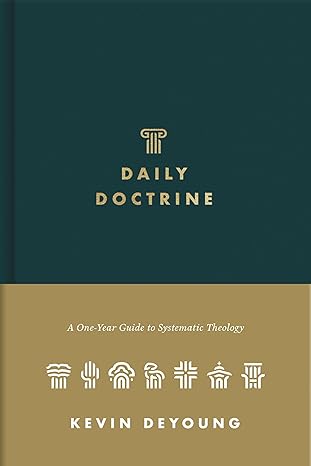A Book Review from Books At a Glance
by Ryan M. McGraw
The scope of theology can be at once simple and daunting. Simple in that it encompasses only two subjects: God and God’s works. Yet daunting in that God is unfathomable and God’s works include God’s relation to the world, to human history, to redemption in church, to the last things, including the teaching of the church about these things, and more, throughout her history. Systematic theology draws together strands of biblical teaching, often by drawing out assumptions about how such teaching revolves around the triune God. Sometimes systematic theology is called Dogmatics, or dogmatic theology, because theologians do not do theology in isolation, but in conversation with officially accepted church teaching via creeds, confessions, and catechisms (8). In this light, Kevin DeYoung’s Daily Doctrine is a remarkable achievement. Far from being a superficial collection of devotional thoughts taking readers through a year of Christian doctrine, this work is a robust introduction to Reformed systematic theology in its own right. This book can serve as a tremendous aid to Christians wanting to go a step above the Heidelberg or Westminster Shorter catechisms, to students preparing for exams for the ministry, and to pastors desiring to keep fresh on their systematics.
Daily Doctrine is superbly organized and arranged. Breaking his material down into chapters of roughly five-hundred words, DeYoung includes five readings per week totaling two-hundred and sixty lessons, enabling readers to cover the entire system of Reformed doctrine in a year. He progresses through familiar theological loci (or topics), devoting weeks one to four to the prolegomena (“preliminary considerations”) and the doctrine of Scripture, weeks five through fourteen to theology proper, God’s decrees, creation, and providence, weeks fifteen through eighteen to anthropology, weeks nineteen through twenty-two to covenant theology, weeks twenty-three through twenty-seven to Christ’s person, weeks twenty-eight through thirty-two to Christ’s work, weeks thirty-three through thirty-eight to salvation in Christ (soteriology), weeks thirty-nine through forty-eight to the church (ecclesiology), and weeks forty-nine to fifty-two to the last things (eschatology). Covering nearly every primary area of relevance in systematic theology in such carefully planned confines displays exceptional planning and grasp of his material. In a way, he sells his work short by saying that it is “not a textbook per se” (1). While not going into great depth into any subject, he includes almost every standard theological term and distinction relevant to his topics, demonstrating his skill in translating theological ideas by “reading the old, dead guys (and some living people too), digesting their technical arguments and terminology, taking the best of their insights, and then writing with clarity and concision for busy pastors, students, leaders, and laypeople” (1). With characteristic wit, he notes that readers could use his text as “a Tiny Turretin or Baby Berkhof” (2). His chapters are clear, precise, God-centered, and spiritually satisfying, making theology simple but not superficial. Though largely uncluttered with footnotes, the author highlights and explains some of his most frequently cited sources in an appendix (375-377).
In short, DeYoung’s book is simple, without being superficial. He presents systematic theology at just the right level for church members at large, and while not as extensive as other introductory theological textbooks, he gives readers the lay of the land with key terms, essential Scripture passages, persuasive arguments, and all in an engaging style. Grasping Reformed theology at a deeper level is increasingly pressing as many are tempted by the allure of robust alternatives. Since many people do not dig deep into their own system of doctrine before being confronted with alternative ones, this book is a must read for all members of Reformed churches.
Ryan M. McGraw
Greenville Presbyterian Theological Seminary
